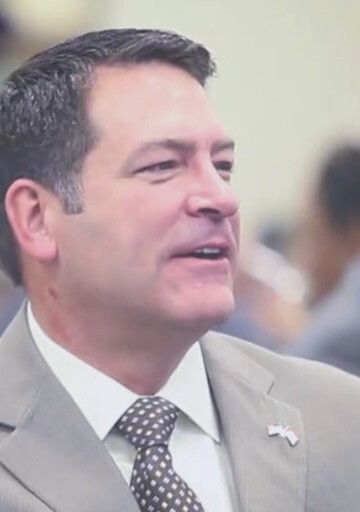Oregon Senator Jeff Merkley, ENDA's lead sponsor.
BY PAUL SCHINDLER | With 60 votes needed to allow the Senate to proceed to consideration of the Employment Non-Discrimination Act, seven Republicans joined 54 Democrats to adopt cloture early in the evening on November 4.
The final tally was 61-30, with nine senators not voting.
The 60 votes were needed to block any attempt at a filibuster by those opposed to the measure. But as the day began, ENDA advocates had the public support of only 59 senators — all 55 Democrats plus Republican co-sponsors Susan Collins of Maine and Mark Kirk of Illinois, as well as Utah's Orrin Hatch and Alaska's Lisa Murkowski, who had voted for the bill in committee during the summer.
Speaker John Boehner resists House action
A statement on the morning of the vote from Senator Dean Heller, Majority Leader Harry Reid's Nevada colleague from across the aisle, upped the number supporting cloture to 60, but Missouri Democrat Claire McCaskill was absent from Washington due to the death of her mother back in St. Louis. Republican Murkowski also did not vote. As a result, the vote proved nerve-wracking until the final moment.
According to a Senate staffer, as the yes votes stalled at 58, Collins recognized that further negotiation was needed on the question of religious exemptions from ENDA before additional GOP members could be brought around. Three Republicans were in play –– Rob Portman of Ohio, who last year announced his support for marriage equality while noting his son is gay, Kelly Ayotte of New Hampshire, and Pat Toomey of Pennsylvania. Collins pulled the three into a Senate cloakroom meeting with New York Democrat Chuck Schumer, where Ayotte and Portman indicated their concern was that no religious group invoking an exemption under ENDA should be held liable by any state or local government action. Toomey was looking for something broader –– an exemption by private corporations and individuals claiming a religious objection, which would essentially gut the legislation. In fact, some leading legal advocacy groups believe the language in ENDA already provides too broad a religious exemption.
According to the Senate staffer, Schumer, Ayotte, and Portman agreed that an amendment barring state and local governments from stepping in to limit ENDA's exemptions –– with the potential to curb existing protections under state and municipal law –– would be considered and could be approved by a simple majority. Toomey's amendment will also be considered, but would require a 60-vote margin for approval, meaning that the Pennsylvanian will be able to say he pushed for the amendment but will have no chance of it being approved.
Reid and Oregon Democrat Jeff Merkley, ENDA's lead sponsor, joined the discussion and approved the two agreements, which in turn led Ayotte, Portman, and Toomey to all vote for the cloture motion.
Senate sources told Gay City News that ENDA sponsors will support the Ayotte-Portman amendment, but no copy of its language has yet been made available either from the offices of several senators contacted or from the Human Rights Campaign, which those sources said approved the language. Utah's Hatch, who was counted on as one of the cloture votes, is said to have made his support contingent on Ayotte and Portman's ability to get a straight up or down vote on their amendment.
In the wake of the successful cloture vote, Schumer told Gay City News, “We have clearly paved the way for victory in the Senate this week.”
Though the Senate –– which last took up the bill in 1996, when it was defeated by just one vote –– is poised to finally approve ENDA, House action in the 2013-2014 session appears unlikely. According to a spokesman for Republican House Speaker John Boehner, “The speaker believes this legislation will increase frivolous litigation and cost American jobs, especially small business jobs.”
California’s Nancy Pelosi, the House minority leader, issued a statement on November 4 criticizing Boehner’s intransigence. Referring to the spending authorized by the House Republicans to oppose lawsuits challenging the federal Defense of Marriage Act, Pelosi, in a written statement, said, “After spending $2.3 million in taxpayer dollars on a failed effort to defend discrimination against LGBT couples in federal courts, no one should be surprised. When the Senate passes this legislation, all options will be on the table in order to advance this critical legislation in the House.”
Her office circulated the transcript of comments Pelosi made on MSNBC the day before, when she noted that after a long delay, Democrats and public pressure last year forced the House’s GOP leadership to allow a vote on reauthorization of the Violence Against Women’s Act (VAWA), which included specific protections for members of the LGBT community.
“We made that bill too hot for the Republicans to handle,” Pelosi said.
In Schumer's view, success in the House is “uphill battle,” but he hastened to add that advocates have to “keep the pressure on.” Pelosi's approach of using the sort of public pressure that worked on VAWA, Schumer said, was the only realistic prospect for success in the current House.
ENDA has only gotten a favorable vote once in Congress, when the House, under Democratic control in 2007, approved a version of the bill that was stripped of protections for transgender workers. Despite the fact that some Senate Republicans have said that protections based on gender identity prevent them from supporting this year’s bill, Merkley repeatedly made clear he would not compromise on that point.
In 2007, then-Congressman Barney Frank of Massachusetts and the Human Rights Campaign faced withering criticism from several hundred other LGBT advocacy groups for removing the gender identity language included in the bill introduced at the beginning of that year. Despite House passage of the measure, it was never taken up by the Senate.
Congress did not act on ENDA in the 2009-2010 session, even though Democrats controlled both houses and President Barack Obama was prepared to sign it.
Despite the inclusion of gender identity language in ENDA this year, there is disagreement among advocates about the measure’s language that centers on the very same issue that hung up Ayotte, Portman, and Toomey. In May, a group of legal advocacy groups — including the American Civil Liberties Union, Lambda Legal, the National Center for Lesbian Rights, and the Transgender Law Center — issued a statement warning that even the religious exemption language as it existed prior to the GOP's efforts this week at amendment provides religiously affiliated groups, including hospitals and universities, with considerably more leeway to discriminate than is customary in civil rights legislation.
At a September 12 forum on ENDA at New York Law School, Tico Almeida, currently the head of Freedom to Work who, in his former role as co-counsel on the House Education and Labor Committee, authored the religious exemption language, defended it, arguing it was a “cut and paste” from Title VII provisions of the 1964 Civil Rights Act. Still, he conceded that Catholic Charities, a large nationwide non-profit that is a major social service provider and employer in many cities, would be exempt from ENDA’s provisions.
In most LGBT nondiscrimination legislation enacted across the country, religious organizations directly related to faith and worship activities are free to apply a religious test for employment. Organizations such as hospitals, however, which act as public accommodations serving the population at large, typically cannot claim a religious exemption except for faith-related activities.
Ian S. Thompson, a legislative representative at the ACLU who took a lead role in issuing the spring statement on the exemption, told Gay City News that he views the bill’s current language as “sweeping” and “unprecedented.” Allowing hospitals and universities to claim such exemptions, he said, is “far afield” of any legitimate or customary practice.
Still, he acknowledged that he and other critics of the language are not pressing to change it now. “The next best opportunity is when sponsors come together in 2015,” Thompson said, noting the unlikelihood of House action before then.
He said he was not concerned that approving the bill with the existing exemption would imperil the chance to change it in the next session of Congress. “We can win the vote this year and improve it later,” Thompson said.
Shortly after the November 4 cloture vote, Merkley, Kirk, and Collins were joined by Democrats Tammy Baldwin of Wisconsin, the Senate's only out LGBT member, and Tom Harkin of Iowa in a written release calling on the Senate to pass ENDA itself in a bipartisan fashion.
“The Employment Non-Discrimination Act is about civil rights,” said Kirk. “In Illinois, we aspire to continue Abraham Lincoln’s legacy of fighting for liberty and human dignity. I measure myself against Senator Everett Dirksen, the Illinois fiscal conservative and social moderate whose passage of the Civil Rights Act in 1964 stood out as one of his best moments as a Republican leader.”
“Every American deserves the freedom to work free of discrimination,” said Baldwin. “Passing ENDA is about opportunity – about whether every American gets to dream the same dreams, chase the same ambitions, and have the same shot at success.”
In a written statement, New York's Schumer, said, “It is hard to believe that it took 17 years to make progress on this important and just legislation when 17 years ago it only failed the Senate by one vote. But the march in America towards equality is inexorable and this legislation will become law sooner than people think.”































